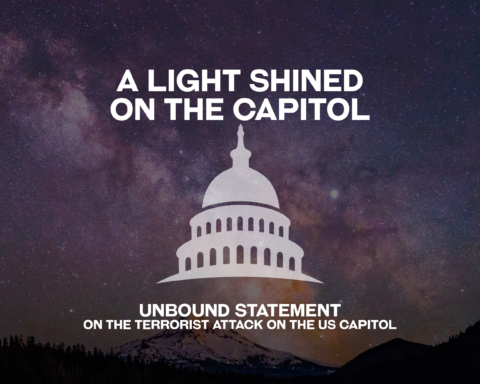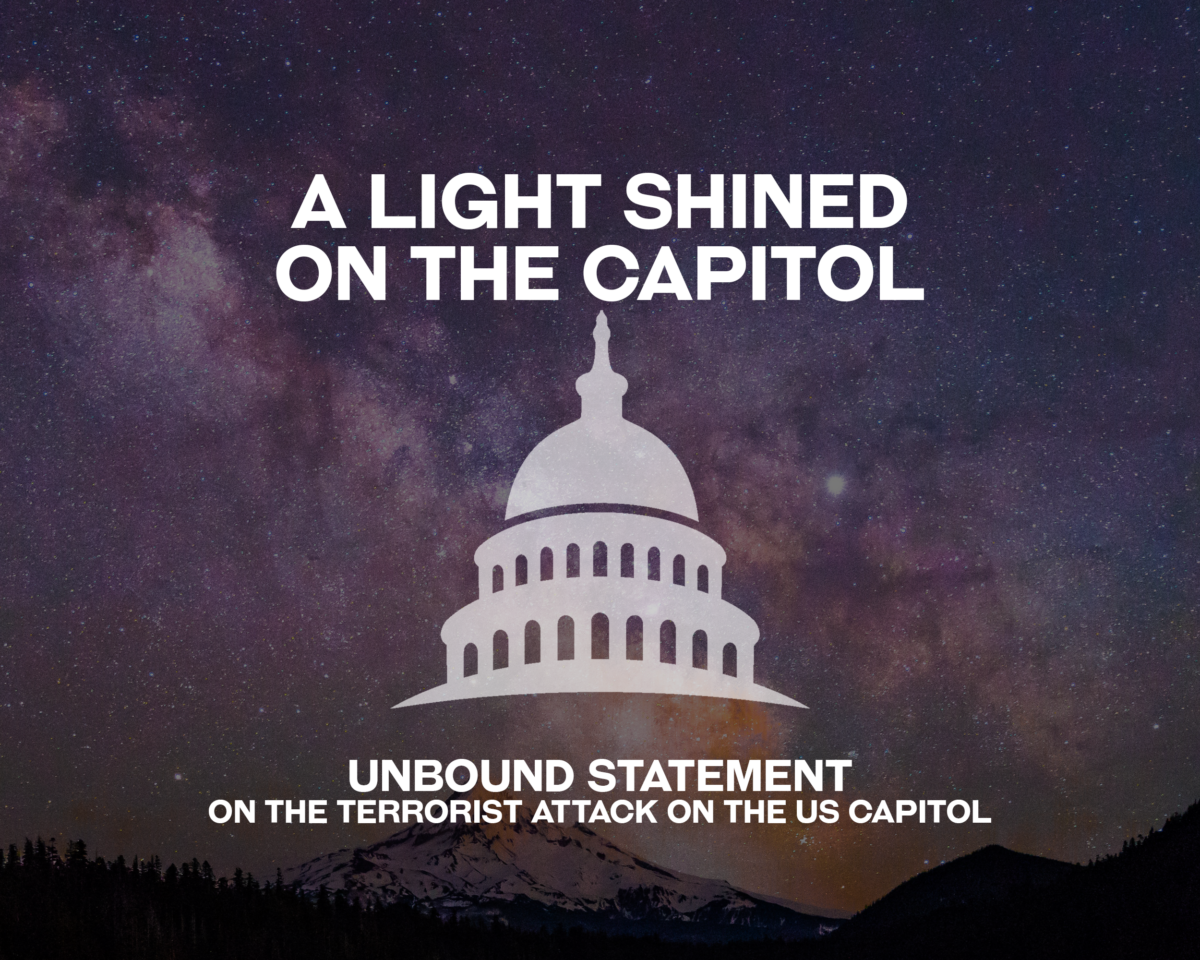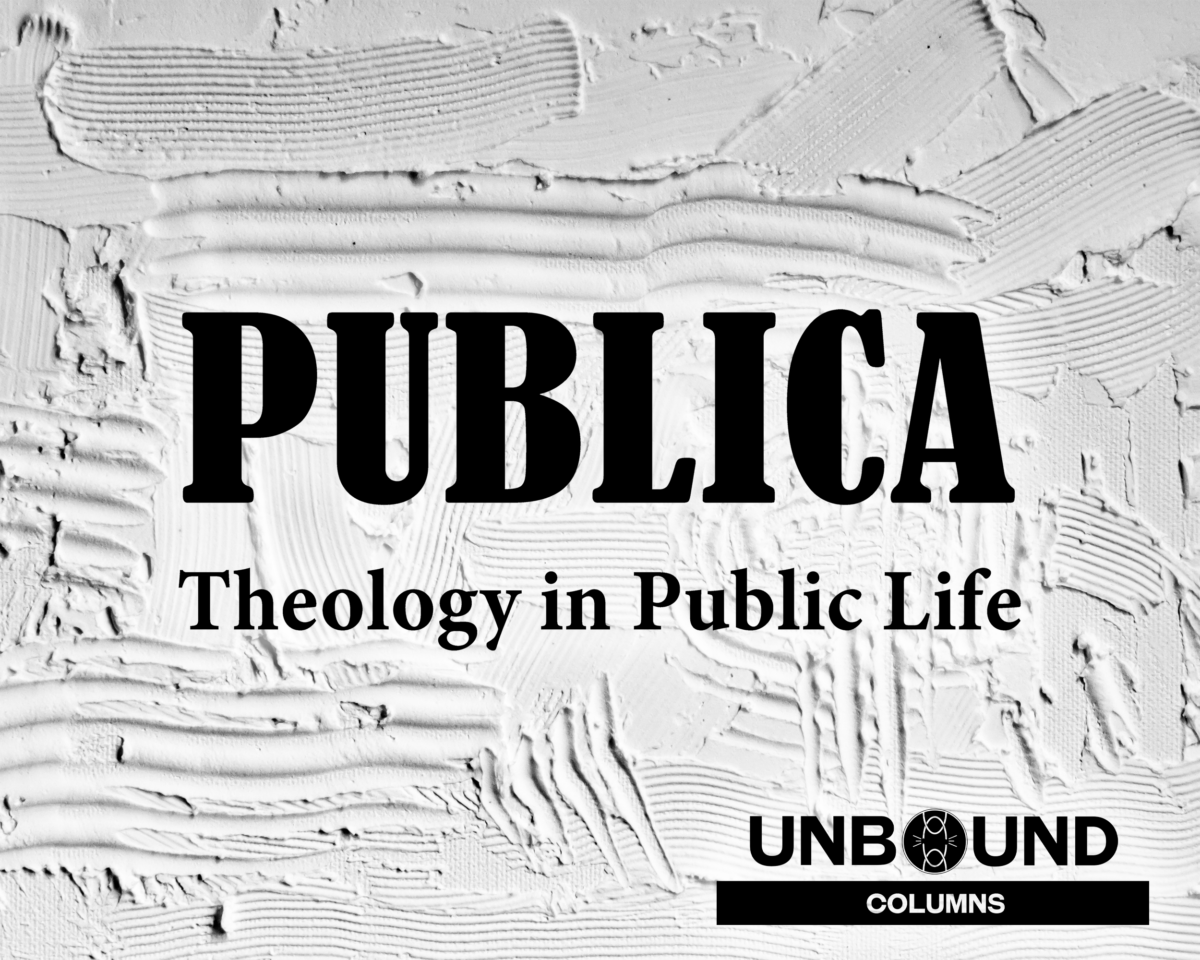Moderate and progressive Christians have always found it hard to take Donald Trump seriously as a false messiah, much less an actual one. In the name of Trump, some 1000 or so extremists invaded and occupied the Senate and House chambers for several hours on January 6, prompting many Republicans and Democrats to refer to those sites as “sacred” spaces that had been desecrated by force and vandalism. For some, democracy may itself be sacred, by which they mean of highest value. The ritual of publicly counting the electoral votes from the states was thus a sworn duty that was interrupted. Such public ceremonies are important expressions of patriotism, and even a certain amount of “civil religion” can be justified. Flags and other symbols, like the Capitol building itself, share in the virtues to which they point.
But while “the People’s house” rightly enshrines the values and history of the American self-government, it is not a place dedicated to the worship of God. However often, “God bless the United States” is uttered, the transcendent God holds all nations to account and is not a tribal deity of any one nation. St Paul makes the very basic case for every believer carrying the “temple of the Holy Spirit” in their heart. The nature of that Spirit was defined by Jesus in Matthew 23, where he warns of “whitened sepulchers,” shiny on the outside but inwardly corrupt, and warns against putting legalistic forms above the “weightier matters of the law: justice, mercy, and faithfulness…”
That lesson about God’s transcendence and the holiness of justice was arguably not learned by the most devout or cynical of President Trump’s legislative supporters after order had been restored. Seven senators and 138 members of the House of Representatives continued to challenge the electoral college votes of Pennsylvania despite the careful attestations of the vote’s accuracy by that state’s Republican Senator, Pat Toomey and others. It is hard to see this defiance of facts and willingness to take away the votes of other citizens as anything other than devotion to an authoritarian leader or to his tribe or “base.” Such base calculations must be disavowed by the faithful Trump legislators, of course, but the evident disgust of some of their colleagues showed the objectors’ devotion to the Constitution was not believed. Their memory of the Trump flags being raised over the nation’s flag was perhaps too fresh.
If run-off elections in Georgia had not yielded two new Democratic Senators, tilting Senate control away from the Republican Party via the tie-breaking role of the new Vice President, it is hard to believe there would be any accountability for the largely white rioters and those who incited them, especially the President. The Republicans may be fortunate, as Ross Douthat of the NY Times suggests, that their loss of power may help them disentangle from Trump. After all, enabling Trump suggests that our democracy is about as secure as the Capitol building—though certainly nonviolent Black protesters wouldn’t have gotten anywhere near inside the building. The rioters’ breach of the chambers was a revelation or epiphany—appearance—of how hollowed out, and not hallowed, the space had become under Mitch McConnell’s long blockade of most non-budgetary legislative business other than the rubber-stamping of judges. This posturing of governance had perhaps made many Republicans susceptible to the lure of fantasy politics as practiced by President Trump. For how long did Mitch McConnell himself refuse to acknowledge Joe Biden’s victory, much less congratulate him on it?
The debasement of political life in the Capitol was perhaps summarized best in Trump’s own words:
“These are the things and events that happen when a sacred landslide election victory is so unceremoniously & viciously stripped away from great patriots who have been badly & unfairly treated for so long,” Mr. Trump tweeted Wednesday evening, after spending much of the afternoon in the Oval Office watching footage of escalating violence unfolding on Capitol Hill. “Go home with love & in peace. Remember this day forever!” (my underlining)
How many falsehoods can be contained in a single sentence? But underneath the lies, disavowed responsibility, and projected viciousness is the confusion of “sacred” with greatness and patriotism with worship of a leader—who must be victorious. Michael Cohen, Trump’s former lawyer, thinks that Trump now believes he won the election—a clear case for Amendment 25 removal from office of a president due to inability, in this case to accept reality. But it would not help the cause of justice, the highest civic virtue, to have Trump effectively pardoned for mental illness. This is a man who on Saturday, January 2nd, tried to repeat with the Georgia Secretary of State the same bullying corruption he tried with the President of Ukraine, for which he was impeached by the House, though perfunctorily acquitted by the Senate. For those Republican senators and congresspeople voting to overturn the votes of other states, there is no end to the enabling of this lawlessness.
Scripture describes a range of virtues and values needed for deliverance from sin and evil that Trump has never possessed. Jesus sums up the New Testament argument in Matthew 12: 26-30: “If Satan drives out Satan, he is divided against himself,” the verse prior to the one Abraham Lincoln adopted in his 1858 speech, “a house divided cannot stand.” The so-called Evangelical Christians who voted for Trump made a choice for a kind of satan (deceiver) to drive out satan (“evil people:” others of various kinds).
To summarize: calling halls of public power and authority, “sacred,” opens us to national idolatry and the false belief in an exceptionalism that is self-deceiving. Reserve holiness for God. As Senator Michael Bennet of Colorado noted, the Founders were very aware of the precedent of the Fall of the Roman Republic, hollowed out and corrupted. George Washington, no Caesar, returned to Mount Vernon like Roman hero Cincinnatus returned to his farm. We do need to hold the Senate and House of Representatives up to the highest of values, but these are only shown in just governance, not nationalistic self-flattery.
Part of that just governance is holding those who would betray the People’s trust to real account for incitement, sedition, corruption, and even insurrection—“Lock him up!” But beyond restoring the rule of law to those who have abused their power, we need to reform the undemocratic elements in the Constitution which allow for several kinds of minority rule, like the Electoral College, which is hardly a sacred thing. Let us pray that the new President’s quest for unity does not blind him to the cleansing needed even in civic temples.
Chris Iosso is the former Coordinator of the Advisory Committee on Social Witness Policy. A former pastor and part-time college professor, he plans to continue serving the church either in the parish or in other hands-on justice work in this new year. His most recent book is Christian Ethics in Conversation, co-edited with Isaac Sharp, a festschrift honoring Donald W. Shriver and describing the strengthening of Union Seminary, NY, as a progressive, intercultural, and ecumenical seminary.






Unbound Social